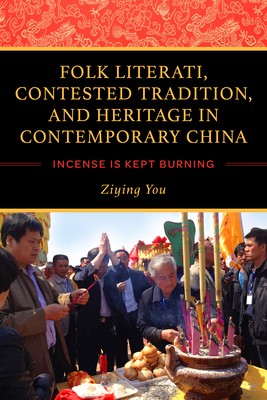
- We will send in 10–14 business days.
- Author: Ziying You
- Publisher: Indiana University Press
- ISBN-10: 025304636X
- ISBN-13: 9780253046369
- Format: 15.2 x 22.9 x 1.6 cm, minkšti viršeliai
- Language: English
- SAVE -10% with code: EXTRA
Folk Literati, Contested Tradition, and Heritage in Contemporary China (e-book) (used book) | bookbook.eu
Reviews
Description
In this important ethnography Ziying You explores the role of the "folk literati" in negotiating, defining, and maintaining local cultural heritage. Expanding on the idea of the elite literati--a widely studied pre-modern Chinese social group, influential in cultural production--the folk literati are defined as those who are skilled in classical Chinese, knowledgeable about local traditions, and capable of representing them in writing. The folk literati work to maintain cultural continuity, a concept that is expressed locally through the vernacular phrase: "incense is kept burning."
You's research focuses on a few small villages in Hongtong County, Shanxi Province in contemporary China. Through a careful synthesis of oral interviews, participant observation, and textual analysis, You presents the important role the folk literati play in reproducing local traditions and continuing stigmatized beliefs in a community context. She demonstrates how eight folk literati have reconstructed, shifted, and negotiated local worship traditions around the ancient sage-Kings Yao and Shun as well as Ehuang and Nüying, Yao's two daughters and Shun's two wives. You highlights how these individuals' conflictive relationships have shaped and reflected different local beliefs, myths, legends, and history in the course of tradition preservation. She concludes her study by placing these local traditions in the broader context of Chinese cultural policy and UNESCO's Intangible Cultural Heritage program, documenting how national and international discourses impact actual traditions, and the conversations about them, on the ground.
EXTRA 10 % discount with code: EXTRA
The promotion ends in 23d.01:55:47
The discount code is valid when purchasing from 10 €. Discounts do not stack.
- Author: Ziying You
- Publisher: Indiana University Press
- ISBN-10: 025304636X
- ISBN-13: 9780253046369
- Format: 15.2 x 22.9 x 1.6 cm, minkšti viršeliai
- Language: English English
In this important ethnography Ziying You explores the role of the "folk literati" in negotiating, defining, and maintaining local cultural heritage. Expanding on the idea of the elite literati--a widely studied pre-modern Chinese social group, influential in cultural production--the folk literati are defined as those who are skilled in classical Chinese, knowledgeable about local traditions, and capable of representing them in writing. The folk literati work to maintain cultural continuity, a concept that is expressed locally through the vernacular phrase: "incense is kept burning."
You's research focuses on a few small villages in Hongtong County, Shanxi Province in contemporary China. Through a careful synthesis of oral interviews, participant observation, and textual analysis, You presents the important role the folk literati play in reproducing local traditions and continuing stigmatized beliefs in a community context. She demonstrates how eight folk literati have reconstructed, shifted, and negotiated local worship traditions around the ancient sage-Kings Yao and Shun as well as Ehuang and Nüying, Yao's two daughters and Shun's two wives. You highlights how these individuals' conflictive relationships have shaped and reflected different local beliefs, myths, legends, and history in the course of tradition preservation. She concludes her study by placing these local traditions in the broader context of Chinese cultural policy and UNESCO's Intangible Cultural Heritage program, documenting how national and international discourses impact actual traditions, and the conversations about them, on the ground.


Reviews